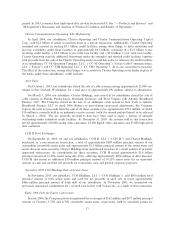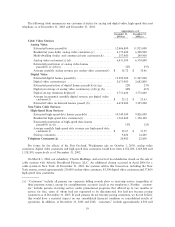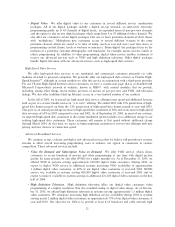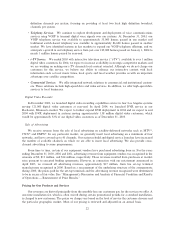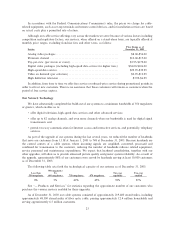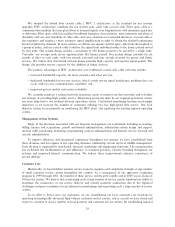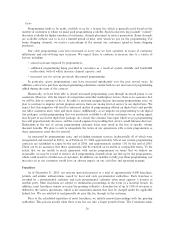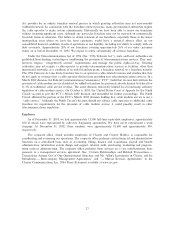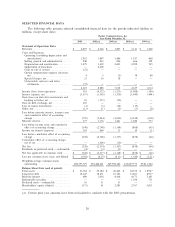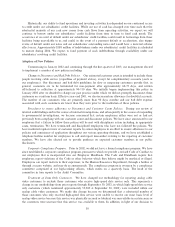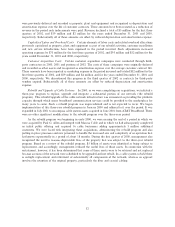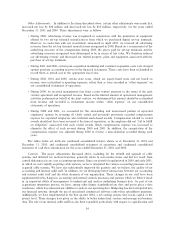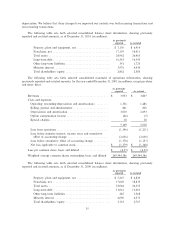Charter 2003 Annual Report Download - page 29
Download and view the complete annual report
Please find page 29 of the 2003 Charter annual report below. You can navigate through the pages in the report by either clicking on the pages listed below, or by using the keyword search tool below to find specific information within the annual report.Act provides for an orderly franchise renewal process in which granting authorities may not unreasonably
withhold renewals. In connection with the franchise renewal process, many governmental authorities require
the cable operator to make certain commitments. Historically we have been able to renew our franchises
without incurring signiÑcant costs, although any particular franchise may not be renewed on commercially
favorable terms or otherwise. Our failure to obtain renewals of our franchises, especially those in the major
metropolitan areas where we have the most customers, would have a material adverse eÅect on our
consolidated Ñnancial condition, results of operations or our liquidity, including our ability to comply with our
debt covenants. Approximately 28% of our franchises covering approximately 26% of our video customers
expire on or before December 31, 2005. We expect to renew substantially all of these franchises.
Under the Telecommunications Act of 1996 (the ""1996 Telecom Act''), state and local authorities are
prohibited from limiting, restricting or conditioning the provision of telecommunications services. They may,
however, impose ""competitively neutral'' requirements and manage the public rights-of-way. Granting
authorities may not require a cable operator to provide telecommunications services or facilities, other than
institutional networks, as a condition of an initial franchise grant, a franchise renewal, or a franchise transfer.
The 1996 Telecom Act also limits franchise fees to an operator's cable-related revenues and clariÑes that they
do not apply to revenues that a cable operator derives from providing new telecommunications services. In a
March 2002 decision, the Federal Communications Commission (""FCC'') held that revenue derived from the
provision of cable modem service should not be added to franchise fee payments already limited by federal law
to 5% of traditional cable service revenue. The same decision tentatively limited local franchising authority
regulation of cable modem service. On October 6, 2003, the United States Court of Appeals for the Ninth
Circuit vacated in part the FCC's March 2002 decision and remanded for further proceedings. The Ninth
Circuit aÇrmed the portion of the FCC's March 2002 decision holding that cable modem service is not a
""cable service.'' Although the Ninth Circuit's decision should not subject cable operators to additional cable
franchise fee requirements for the provision of cable modem service, it could possibly result in other
telecommunications regulation.
Employees
As of December 31, 2003, we had approximately 15,500 full-time equivalent employees, approximately
300 of which were represented by collective bargaining agreements. We have never experienced a work
stoppage. At December 31, 2002, these numbers were approximately 18,600 and approximately 300,
respectively.
The corporate oÇce, which includes employees of Charter and Charter Holdco, is responsible for
coordinating and overseeing our operations. The corporate oÇce performs certain Ñnancial and administrative
functions on a centralized basis such as accounting, billing, Ñnance and acquisitions, payroll and beneÑt
administration, information system design and support, internal audit, purchasing, marketing and program-
ming contract administration. The corporate oÇce performs these services on a cost reimbursement basis
pursuant to a management services agreement. See ""Certain Relationships and Related Transactions Ì
Transactions Arising Out of Our Organizational Structure and Mr. Allen's Investment in Charter and Its
Subsidiaries Ì Intercompany Management Agreements'' and ""Ì Mutual Services Agreements'' in the
Charter Communications, Inc. 2004 Proxy Statement available at www.sec.gov.
27


